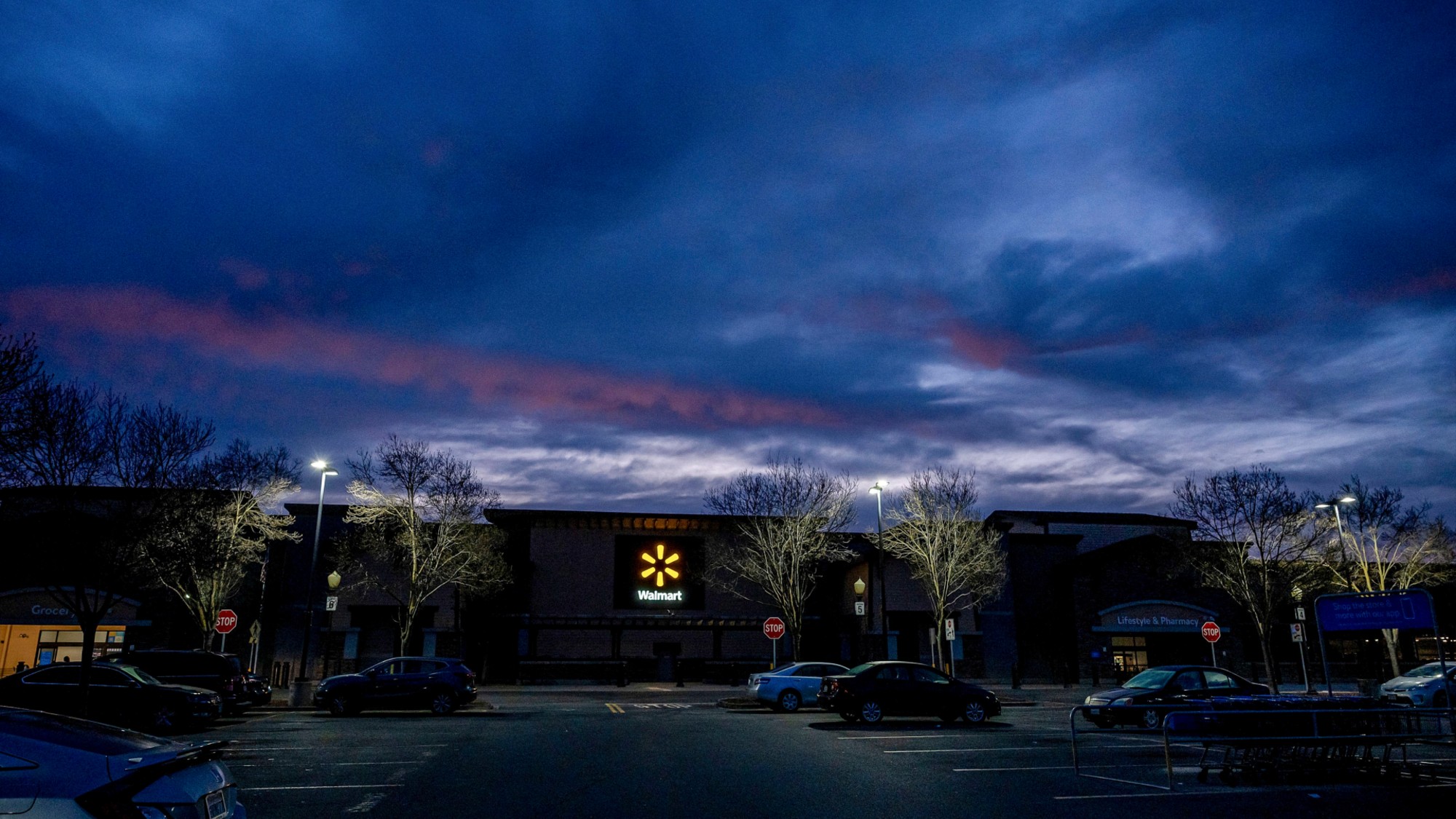Will Trump's tariffs hurt Walmart?
The world's biggest retailer 'isn't immune' to trade impacts


A free daily email with the biggest news stories of the day – and the best features from TheWeek.com
You are now subscribed
Your newsletter sign-up was successful
Walmart is the biggest retailer in the world. But tariffs — especially those against Canada and Mexico — could weaken one of America's strongest brands.
The retailer's stock price dropped last week after an executive said Walmart is "not going to be completely immune" to President Donald Trump's new tariffs, said NBC News. Chief Financial Officer John David Rainey tried to reassure investors, pointing out that about two-thirds of the brands are "sourced" in the U.S., making them off-limits to trade taxes. The tariffs on America's neighbors have been delayed, leaving analysts unsure what comes next. The company would "do what we know how to do" to keep prices down, said Rainey.
Even so, "uncertainty about the state of the American consumer" means Walmart is preparing for 2025 to be a challenging year, said The Associated Press. Tariffs could "threaten the low-price model that is the core of Walmart's success." Even with Walmart's ability to "hedge" against inflation, "some goods may have price increases."
The Week
Escape your echo chamber. Get the facts behind the news, plus analysis from multiple perspectives.

Sign up for The Week's Free Newsletters
From our morning news briefing to a weekly Good News Newsletter, get the best of The Week delivered directly to your inbox.
From our morning news briefing to a weekly Good News Newsletter, get the best of The Week delivered directly to your inbox.
What did the commentators say?
Walmart's warning could be a "bad omen for the consumer sector," said Andrea Felsted at Bloomberg. The world's biggest retailer has a "better chance than most competitors of minimizing" the impacts of tariffs on consumers because it can "get the best deals from suppliers." Given those advantages, the company probably wanted to "under-promise in the hope of overdelivering" on profits. Still, it's worth noticing the "tariff clouds on the horizon."
"Shoppers have flooded" into Walmart during the post-pandemic inflation crisis, said Nathaniel Meyersohn at CNN. But other retailers have "less leverage and may have to raise prices for consumers" as tariffs kick in. Walmart's own sales remain relatively strong for now, but its warning to investors of a "slower 2025" is a "bad sign for America's economy," Meyersohn said. And it's a "signal for the rest of the retail industry that 2025 will be a rockier year."
What next?
Walmart's guidance to investors "may have more to do with weight-loss drugs" than Trump's tariffs, said MarketWatch. The company has acknowledged that the sale of GLP-1 medications like Ozempic and Wegovy have "slightly helped sales for their pharmacy businesses," said Modern Retail. The problem is that research shows consumers "cut their grocery spending by about 6%" after they start taking the drugs. That can lead to big drops in the sales of "calorie-dense, processed items like chips."
What happens next depends on shoppers. The "consumer decides" whether tariffs matter or not, former Walmart U.S. CEO Bill Simon said to CNBC. If Trump imposes a fee on Mexican avocados, consumers will have to decide: will "you have guacamole with your chips or do you have salsa and queso where there is no tariff?" He said Walmart — and other super-sized retailers like Costco, Target and Amazon — will be OK. "Those guys will figure out tariffs."
A free daily email with the biggest news stories of the day – and the best features from TheWeek.com
Joel Mathis is a writer with 30 years of newspaper and online journalism experience. His work also regularly appears in National Geographic and The Kansas City Star. His awards include best online commentary at the Online News Association and (twice) at the City and Regional Magazine Association.
-
 The Olympic timekeepers keeping the Games on track
The Olympic timekeepers keeping the Games on trackUnder the Radar Swiss watchmaking giant Omega has been at the finish line of every Olympic Games for nearly 100 years
-
 Will increasing tensions with Iran boil over into war?
Will increasing tensions with Iran boil over into war?Today’s Big Question President Donald Trump has recently been threatening the country
-
 Corruption: The spy sheikh and the president
Corruption: The spy sheikh and the presidentFeature Trump is at the center of another scandal
-
 Is the US in a hiring recession?
Is the US in a hiring recession?Today's Big Question The economy is growing. Job openings are not.
-
 Did markets’ ‘Sell America’ trade force Trump to TACO on Greenland?
Did markets’ ‘Sell America’ trade force Trump to TACO on Greenland?Today’s Big Question Investors navigate a suddenly uncertain global economy
-
 Buffett: The end of a golden era for Berkshire Hathaway
Buffett: The end of a golden era for Berkshire HathawayFeature After 60 years, the Oracle of Omaha retires
-
 Will Trump’s 10% credit card rate limit actually help consumers?
Will Trump’s 10% credit card rate limit actually help consumers?Today's Big Question Banks say they would pull back on credit
-
 Can Trump make single-family homes affordable by banning big investors?
Can Trump make single-family homes affordable by banning big investors?Talking Points Wall Street takes the blame
-
 How prediction markets have spread to politics
How prediction markets have spread to politicsThe explainer Everything’s a gamble
-
 What will the US economy look like in 2026?
What will the US economy look like in 2026?Today’s Big Question Wall Street is bullish, but uncertain
-
 Tariffs have American whiskey distillers on the rocks
Tariffs have American whiskey distillers on the rocksIn the Spotlight Jim Beam is the latest brand to feel the pain
